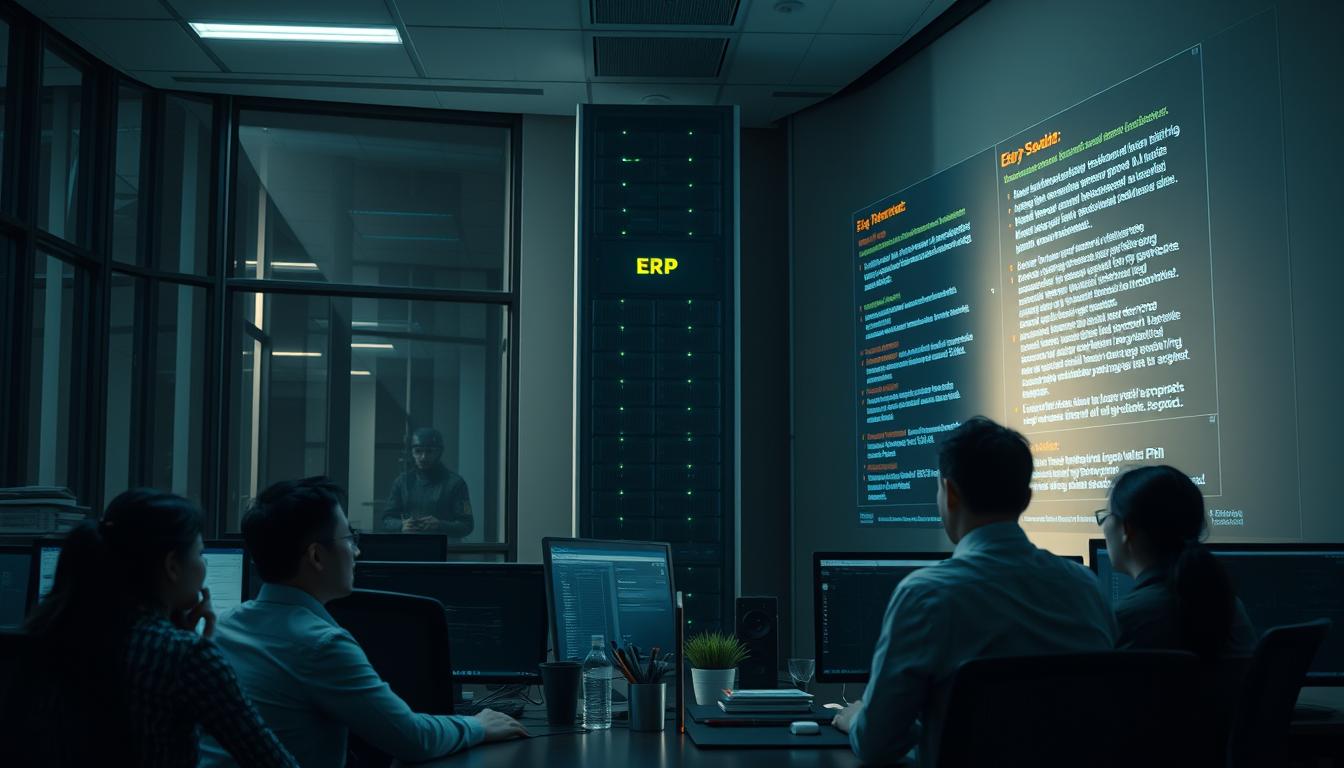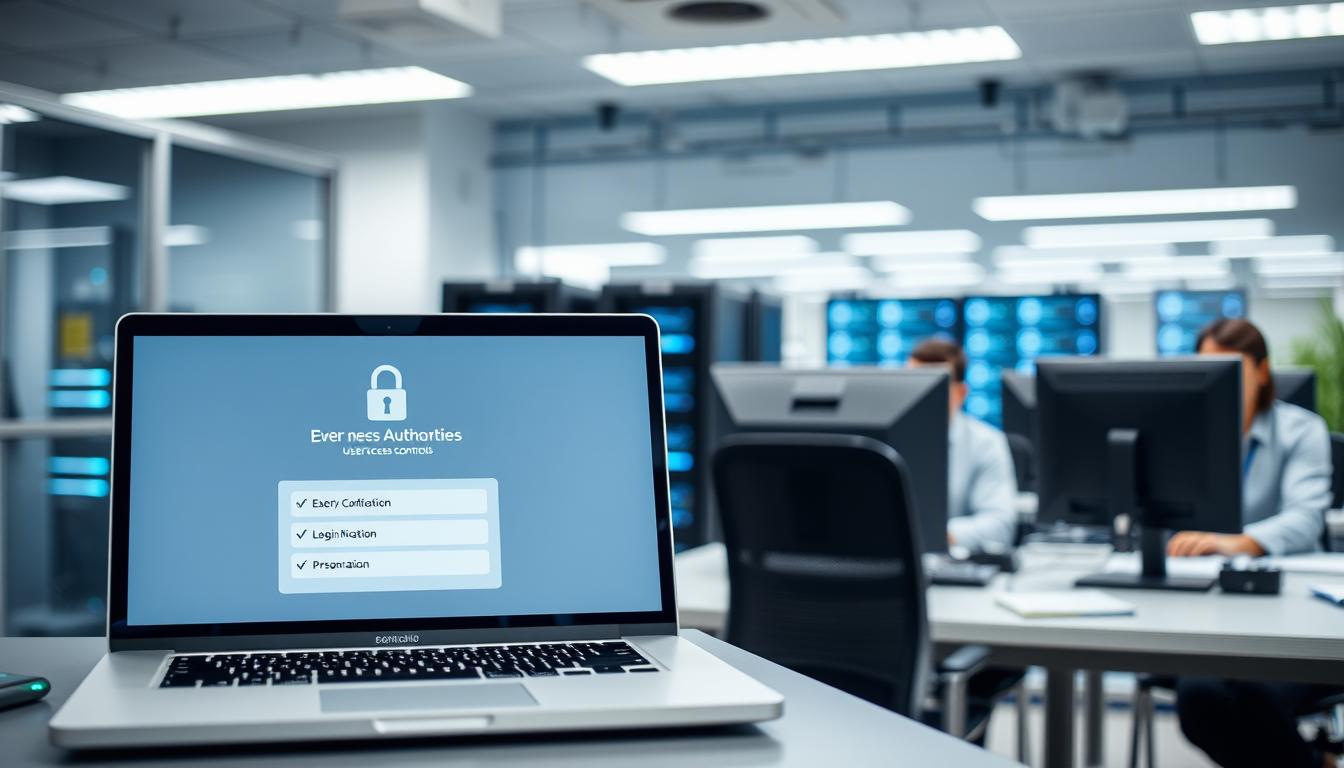In today’s world, data breaches are a big problem. Can you really afford to leave your business data at risk? An ERP security checklist is key to keeping your data safe. It’s not just a guide; it’s a must-have for business data protection.
ERP systems hold important data for all departments. This makes them critical for cybersecurity for SMEs. If you ignore security risks, it could hurt your business a lot. It could cost a lot to fix, and it could damage your reputation.
By using a detailed checklist, SMEs in the Philippines can protect their data. They can also make their systems stronger against new threats.
Key Takeaways
- Understanding the role of ERP systems in centralizing business data is crucial.
- Prioritizing security measures can minimize risks associated with cyber attacks.
- A comprehensive ERP security checklist is essential for SMEs.
- Regular updates and training are vital for ongoing protection.
- Employees play a key role in cybersecurity for SMEs.
- Incorporating multi-factor authentication enhances security layers.
Understanding the Importance of ERP Security
In today’s fast-changing digital world, ERP security is more important than ever. Small and medium-sized enterprises (SMEs) are a big part of the economy. They face more cyber threats than ever before.
More data breaches are happening to these businesses. This shows how vital it is for them to keep their sensitive info safe.
Impact of Cyber Attacks on SMEs
Cyber attacks on SMEs are getting worse. A lot of data breaches happen to these businesses. This makes them very vulnerable.
They often don’t have enough money to protect themselves well. This makes them easy targets for hackers who want to get into ERP systems.
Why ERP Systems are Attractive Targets
ERP systems bring together important business processes and data. They have a lot of valuable information, like financial records and customer details. This makes them a big target for hackers.
The risks to these systems are huge. Not just for the business, but also for its customers. This is why keeping ERP systems secure is so important.
Common ERP Security Risks
It’s vital for companies to know about ERP security risks to keep their data safe. Human mistakes can lead to big problems, like data leaks. These errors can cause a lot of financial and reputation damage.
Human Error and Data Breaches
Human mistakes are a top reason for data breaches in ERP systems. Employees might share sensitive info by mistake or not follow security rules. They might not get enough training, leading to errors.
Companies should focus on training their staff well. This helps them understand and follow security rules. Also, making systems easy to use can help avoid these mistakes.
Complexity of ERP Systems
ERP systems can be complex, which makes them vulnerable to security threats. As these systems grow, they become harder to manage. This can lead to hidden weaknesses that hackers can find.
Regular checks are key to finding and fixing these weaknesses. Teaching employees about the ERP system’s unique features helps them spot potential risks. This way, they can help keep the system secure.
Implementing Strong Password Policies
Protecting sensitive data in ERP systems is key. A strong password policy is vital to stop unauthorized access. Companies should focus on creating ERP password policies that require unique, strong passwords for all apps. This helps lower the risk of data breaches and misuse.
Best Practices for Password Management
Passwords need to be at least 12 characters long. They should mix uppercase and lowercase letters, numbers, and symbols. This makes them harder to guess. Also, avoid using the same password for different apps. Using password managers helps employees create and keep track of complex passwords.
Importance of Unique Passwords for Each Application
Having unique passwords for each app boosts security. If one password is hacked, it only affects that app. This limits damage. Companies with strict ERP password policies are better protected. They ensure that even if one password is compromised, others stay safe. This makes the workplace safer for sensitive business data.
Multi-Factor Authentication: An Essential Layer of Security
Adding multi-factor authentication (MFA) to ERP systems is key for better security. It makes users give two or more proofs to get to sensitive data. This way, businesses can greatly lower the chance of unauthorized access.
The benefits of MFA are obvious. It adds a security layer that simple passwords can’t. Users might get a text or use an app for extra verification. This means even if a password is stolen, hackers can’t easily get in.
Companies should make MFA a part of their ERP security plans. It not only keeps data safe but also makes customers trust them more. As cyber threats grow, so should our defense strategies. Using MFA helps build a stronger shield against attacks.
| Feature | Single-Factor Authentication | Multi-Factor Authentication |
|---|---|---|
| Access Method | Password only | Password + additional factor |
| Security Level | Low | High |
| Ease of Use | Simple | More steps required |
| Best for | Basic access | Sensitive data |
Investing in MFA cuts down data breach risks and meets regulatory needs. Businesses in the Philippines should focus on these security steps. This will help keep their ERP systems safe and their operations strong.
Regular Software Updates and Patching
Keeping ERP systems safe needs constant work, mainly through regular updates. Old software can harm business data, so SMEs must watch their systems closely.
The Risks of Outdated ERP Software
Old ERP software has big security problems. If companies don’t update, they face threats like malware and data theft. Hackers use these gaps to get to private data, showing the dangers of outdated software.
How Regular Updates Enhance Security
Software patching is very important. Updates fix bugs and add new features. They make systems work better and follow security rules. By focusing on updates, businesses can protect themselves well against threats.
| Update Frequency | Risk Level of Outdated Software | Benefits of Regular Updates |
|---|---|---|
| Monthly | High | Enhanced security, improved performance |
| Quarterly | Medium | Feature enhancements, bug fixes |
| Anually | Low | Basic functionality, stability |
User Access Controls and Authorization Levels
Keeping sensitive data safe in ERP systems is key. Organizations need to set clear rules for who can see what. This way, only the right people can access important data, making it safer.
Role-Based Access Control in ERP Systems
ERP systems use role-based access to manage permissions. Users get access to data based on their job. This keeps them from seeing things they shouldn’t, making data management better.
Reviewing User Permissions Regularly
Checking user permissions often is vital for security. It helps see who can see what data. By fixing any issues, organizations keep their ERP system safe and secure.
Training Employees on Cybersecurity Practices
Protecting against cyber threats is not just about technology. It’s also about training employees. Teaching them about cybersecurity is key to keeping your business safe. They need to know how to spot and stop threats before they happen.
Importance of Continuous Cybersecurity Education
Regular training keeps employees up-to-date on new threats. It teaches them to think security first. When everyone knows their role in keeping data safe, your whole company is stronger against attacks.
Use different training methods like workshops, online courses, and simulations. This makes learning more fun and helps them remember important info.
Common Cyber Threats Employees Should be Aware Of
Teach employees about common threats to your company’s data. These include:
- Phishing attacks, which trick users into revealing sensitive information.
- Ransomware, where attackers lock users out of their systems until a ransom is paid.
- Malware, including viruses and spyware that can infiltrate systems unnoticed.
- Social engineering tactics that exploit human psychology to gain unauthorized access.
Knowing about these threats helps employees stay safe online. This reduces the chance of a breach and builds a culture of caution at work.
Post-Implementation Support for ERP Security
Post-implementation support is key to keeping ERP systems safe and secure. It doesn’t stop after the system is set up. Regular upkeep and quick help from ERP providers are vital to keep data safe and fix any security issues.
Ongoing Maintenance Needs
ERP security needs constant care. Keeping software up to date helps fight off new threats. Security checks make sure systems follow the rules. Checking user permissions often helps prevent unauthorized access.
- Regular software updates
- Security audits and assessments
- User permission reviews
Responsive Support from ERP Providers
Having a quick ERP provider support team is crucial. They can help fast in case of security problems or system failures. Quick action helps keep things running smoothly and protects important data.
“Proactive support is key to minimizing security threats in an ERP environment.”
In summary, good post-implementation support and a committed ERP provider are essential for security. Companies should focus on these to protect their valuable data.
Cloud ERP Security Features
More companies are choosing cloud ERP systems for their strong security. These systems have advanced features to protect sensitive data from cyber threats. They use data encryption, multi-factor authentication, and secure data centers.
Benefits of Cloud Solutions for Data Security
Cloud data security offers many advantages. Moving to cloud ERP saves money on security costs. It also means less work for IT teams.
Automated security and constant monitoring keep data safe. Businesses get more flexibility and can quickly respond to threats. They also get access to the newest security tools, helping them grow.
Vulnerability Assessment in Cloud Environments
It’s crucial to check for vulnerabilities in cloud systems. Regular assessments help find and fix security risks. This keeps data safe and lets companies use cloud technology fully.
Conclusion
Implementing strong ERP security strategies is crucial for companies to protect their data. In the Philippines, using good password policies and controlling user access is important. These steps help keep business data safe from cyber threats.
Keeping software up to date and getting help from ERP providers also helps. This makes systems more secure. Teaching employees about cybersecurity is key to keeping data safe. It helps businesses run smoothly and protects valuable information.
For companies to succeed in today’s digital world, they need a complete security plan. Following these best practices helps them face cyber threats better. It’s not just about survival; it’s about thriving in a digital age.
FAQ
What is the purpose of an ERP security checklist?
An ERP security checklist helps SMEs protect their business data. It finds vulnerabilities and sets up security steps.
Why are SMEs particular vulnerable to cyber attacks?
SMEs lack IT security, making them cyber attack targets. 43% of data breaches hit SMEs because of weak security.
How can employee training help enhance ERP security?
Training employees on cybersecurity threats helps them defend against attacks. It teaches them about phishing and password safety.
What role does multi-factor authentication play in ERP security?
Multi-factor authentication adds a security layer. It requires a second identity check, lowering unauthorized access risk.
How often should ERP software be updated?
Update ERP software regularly. Each update includes security patches that protect against vulnerabilities.
What are the best practices for password management in ERP systems?
Use strong passwords with 12 characters or more. Include letters, numbers, and symbols. Don’t reuse passwords.
What is role-based access control (RBAC) and why is it important?
RBAC gives access based on job roles. It ensures employees only see data they need, reducing risk.
How can cloud ERP solutions enhance security?
Cloud ERP solutions have security features like encryption. They reduce security costs and protect data.
What post-implementation support should organizations expect?
Expect ongoing support like updates, security checks, and user reviews. ERP providers should quickly solve security problems.



